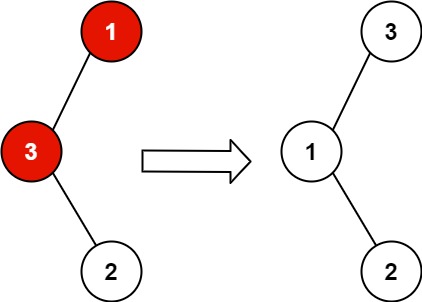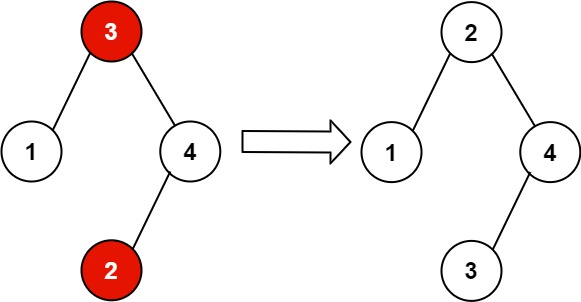You are given the root of a binary search tree (BST), where exactly two nodes of the tree were swapped by mistake. Recover the tree without changing its structure.
Follow up: A solution using O(n) space is pretty straight forward. Could you devise a constant space solution?
Example 1:

Input: root = [1,3,null,null,2] Output: [3,1,null,null,2] Explanation: 3 cannot be a left child of 1 because 3 > 1. Swapping 1 and 3 makes the BST valid.
Example 2:

Input: root = [3,1,4,null,null,2] Output: [2,1,4,null,null,3] Explanation: 2 cannot be in the right subtree of 3 because 2 < 3. Swapping 2 and 3 makes the BST valid.
Constraints:
- The number of nodes in the tree is in the range
[2, 1000]. -231 <= Node.val <= 231 - 1
Idea:
Because inorder traverse BST, all values are sorted. We can use inorder traversal to find two nodes that have prev.val > root. val and swap them
Time complexity: O(n)
Space complexity: O(height)
Solution:
/**
* Definition for a binary tree node.
* function TreeNode(val, left, right) {
* this.val = (val===undefined ? 0 : val)
* this.left = (left===undefined ? null : left)
* this.right = (right===undefined ? null : right)
* }
*/
/**
* @param {TreeNode} root
* @return {void} Do not return anything, modify root in-place instead.
*/
var recoverTree = function(root) {
// javascript can't pass value by reference
// so pass array object by reference
let first = [null];
let second = [null];
let prev = [null];
inorder(root, first, second, prev);
[first[0].val, second[0].val] = [second[0].val, first[0].val];
};
function inorder(root, first, second, prev) {
// Because inorder traverse BST, all values are sorted.
// Using inorder traversal to find two nodes that have prev.val > root.val
if (root === null) return;
inorder(root.left, first, second, prev);
if (prev[0] && prev[0].val > root.val) {
if (first[0] === null) first[0] = prev[0];
second[0] = root;
}
prev[0] = root;
inorder(root.right, first, second, prev);
}